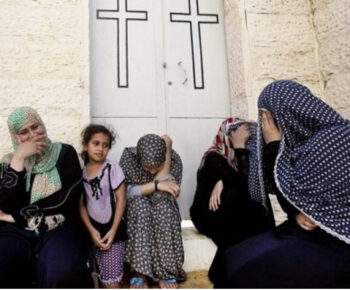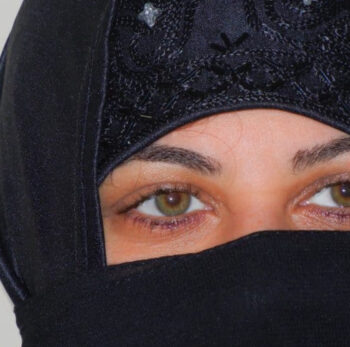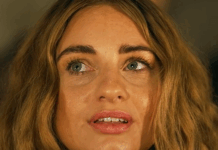
By Michael Ashcraft —
Despairing for forgiveness from Allah, she went to hajj, pilgrimage to Mecca. “Hajj is a way to wipe up your previous sins,” she says. “For Sunni Islam at least they believe you come back like a newborn baby.”
She didn’t feel the expected forgiveness. As she circled the Kaaba stone seven times, she saw people pushing, shoving, stepping on toes, name calling as they vied to touch the stone. It didn’t strike her as a holy experience; it reminded her of Hindus desperately trying to touch their special idols.
”It was madness,” she says. “It was barbaric. I thought, Allah, do you need this bizarre act to forgive me? I’m the same as before, unchanged.”
Wondering at the ridiculousness of the ritual, she said to Allah: You don’t know what it’s like to be a human being
At that time in her life, it was a fearful thing for a good Muslim to say. To question Allah is a very grave sin. Little did she realize how well it squared her up for salvation.
Today, she’s a YouTuber who critiques Islam. She belongs to the approximately half of UK Islamic polemicists who, knowing the danger of debating Muslims, hide their identities to varying degrees. She calls herself simply Daughter of Christ— DoC for short.
DoC grew up in a devout Salafi home. They never missed a prayer and watched hajj on TV romanticizing the dream of one day going to Mecca.
“I did wear the hijab from a very early age — 10,” she says. “We grew up thinking Mohammad was a superhero.”
 The family got the opportunity to love to the West. Dad made sure they moved into a strong Muslim neighborhood and doubled down on the religious exercises. He didn’t want his kids to stray.
The family got the opportunity to love to the West. Dad made sure they moved into a strong Muslim neighborhood and doubled down on the religious exercises. He didn’t want his kids to stray.
“We had a feeling of superiority,” she remembers. “The perception is that Westerners don’t have morality and don’t have the real God.”
DoC got an education in one of the sciences — one that taught her to arrive at truth by questioning things. She got a good job.
While everything was great on the outside, DoC despaired with Islam.
 “You think I’d be happy but actually I was miserable,” she says. “I was sad all the time. The more I read the Koran, the more afraid I got because of its talk of hell. Especially if you read Bukhari, you read a lot about torture in the grave. For every prayer you miss, you’ll be struck by an angel and be driven 70 cubits into the ground; the grave will become narrow and crush your ribs — for small sins.”
“You think I’d be happy but actually I was miserable,” she says. “I was sad all the time. The more I read the Koran, the more afraid I got because of its talk of hell. Especially if you read Bukhari, you read a lot about torture in the grave. For every prayer you miss, you’ll be struck by an angel and be driven 70 cubits into the ground; the grave will become narrow and crush your ribs — for small sins.”
She was exhausted on the treadmill that, no matter how hard she worked, kept getting steeper. There was no comfort, no reward for her intense devotion. Islam offers no confidence to adherents that they’ll make it to heaven — only uncertainty.
She confided to her parents. Islam offered two sure paths: die by jihad or hajj. Dad and DoC packed up for Mecca.
She hoped for renewal. She got dismay. She walked between the mountains seven times — the supposed path of Hagar looking for water (never mind that the Zumzum well is right there.)
She circled the black Kaaba but couldn’t touch it. Too many pilgrims pushed her and other ladies and children out of their way. “I basically watched people treat each other very badly,” she says.
This is what Allah wants? she thought.
Instead of a transformational closeness to Allah, she couldn’t pull herself out of a dark chasm of disappointment and doubt. Islam’s holiest shrine had been a wholly unholy experience.
“I came back thinking, I’m not forgiven,” she recalls. For the first time in her life, she questioned Islam (questions were encouraged in her studies).
How does it change my heart to touch a stone? What is it this rituals that make you different?
”I went to hajj and lost my faith in Allah,” she says.
At that time, her brother had a son. DoC loved her nephew profoundly. Her love brought reflection: “I wish Allah would love me as much I love my nephew.”
“That’s when it dawned on me. Allah is not real,” DoC remembers. “How can I live more than Allah?”
“I just looked at the sky and said, God I want to know the truth. I know you’re not here in this religion,” she says. “Show me. Show me where you are”
A few weeks later, she clicked on a video. The guy talked about Jesus. “What touched me most was his face. He talked like someone who knew God. I never saw this look on a Muslim’s face.”
She came to know Jesus.
“I know now that God does know what it’s like to human,” DoC says. “I don’t know what happened, but a game came to my heart. All the uncertainty and fear of death disappeared. All the restlessness, the emptiness just went completely.”
She got a Bible. “God’s love is on every page,” she says.
DoC read in Hebrews: He is not unable to sympathize with us because he knows our weaknesses.
”Allah wants you to die for him,” she says. “Jesus came and died for us.”
To learn more about a personal relationship with Jesus, click here.
Related articles:
- Meet the man who stopped the tide of Islam at Speaker’s Corner.
- Meet the woman Islam fears most.
- He’s reached 200M Muslims.
- Is Islam taking over Europe with violence?
- Is it true that the Koran is perfectly preserved?
- Are there really mass conversions to Islam in London?
- Sharia enforcement in London
- Mohammed Hijab the modern face of Islam.
About this writer: Michael Ashcraft pastors a church in the San Fernando Valley of Los Angeles.




What a powerful statement: Allah wants you to die for him but Jesus came and died for us.
Comments are closed.